Omicron is not just a variant of concern, rather a reality. Its causes have been reported from all the continents, and it seems to be highly transmissible. Omicron (B.1.1.529) is a highly mutated form of COVID-19.
Although it was first reported from South Africa, new reports suggest that the variant was already present in other continents. Thus, its origins are yet to be confirmed. Moreover, at present, there have been local infection cases with no contact with import cases known currently, indicating that there are other transmission routes that have not been discovered and recorded, so the traceability is of little significance. The primary task is understanding the characteristics of new variants and keeping early detection, early reporting, early quarantine, and early treatment.
Additionally, it is worth understanding that more mutations mean a different clinical picture, response to vaccines, and outcomes. This article discusses ways to identify the Omicron variant in its early stages to prevent its spread in the community.

Symptoms and disease severity caused by Omicron
Numerous case reports in the initial stage have demonstrated the terrifying transmissibility of Omicron despite its less severe symptoms. There is a survey of the Omicron outbreak from Norway suggesting that it may have an incubation period of as small as about three days on average. Nevertheless, it seems to multiply better in bronchi or airways than in lung tissues and usually cause less severe symptoms.
The most common symptoms appear to be cough, runny nose, fatigue, and sore throat. Additionally, it may also cause reduced appetite and abdominal pain. Fever is generally mild. Less common symptoms reported are reduced smell, appetite, taste, and abdominal pain.
However, less severe symptoms do not necessarily mean less deaths and severe cases; its damage to lungs is yet inevitable. According to health experts, although the new variant generally causes milder symptoms, death count increases as the highly transmissible Omicron is causing infection of a record-high large amount of people.
I have cough/fever; am I infected with coronavirus or flu?
The new variant of Covid-19 and its variants may cause symptoms similar to influenza. Here arises a trouble: how to know whether it is Omicron infection or common flu when someone has cough and fever?
Generally, common cold triggers runny nose and discomfort in throat, which are not common symptoms of flu and COVID-19 infection. Flu and Covid-19 infection share symptoms like fever and aching muscle; yet paired with coronavirus, flu usually does not cause cough.
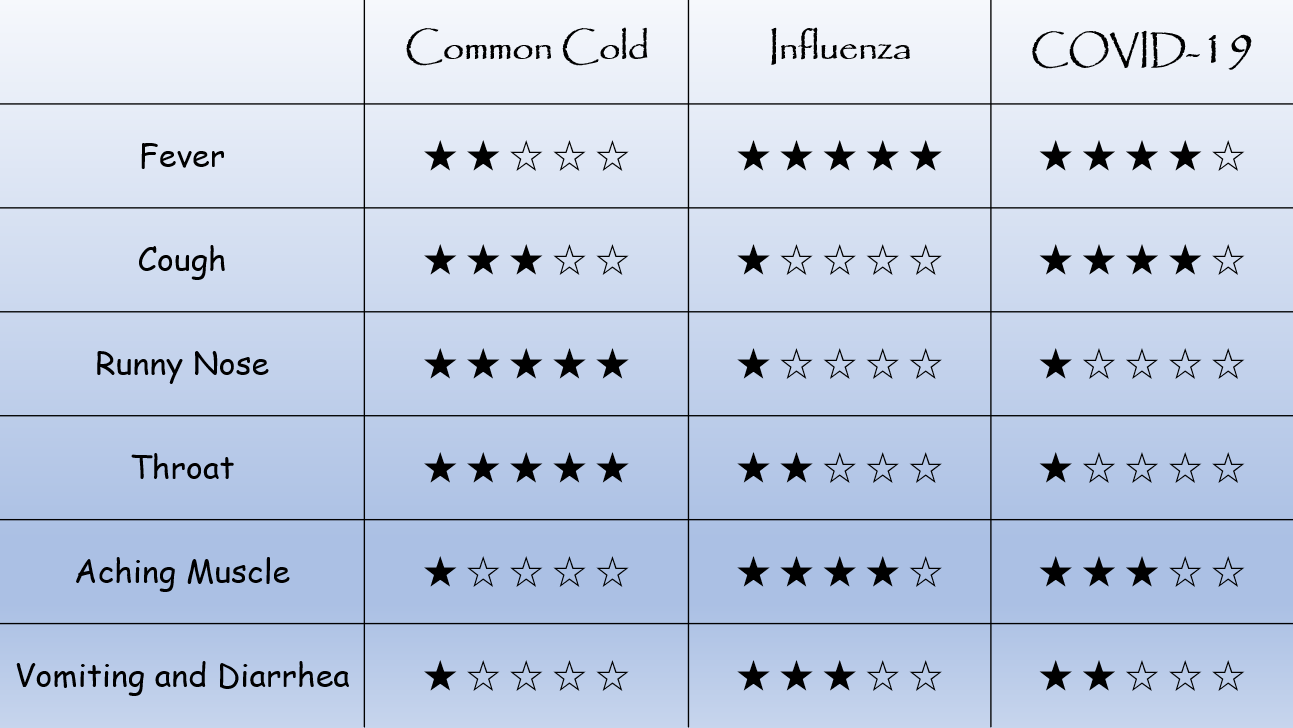
However, as Omicron causes milder symptoms, it is getting harder to identify infection with symptoms. Thus, diagnostic tools are recommended to safeguard your health and to curb the spread of Omicron.
Tests for Omicron
As the new variant has many mutations, concerns have been raised that many Omicron cases may not be diagnosed by existing diagnostic methods, including PCR. Such concern is, to some extent, reasonable, as some of the mutations occur on the target of some diagnostic tests, making some tests fail to detect the variant. Wondfo’s test kits can effectively detect the Omicron variant (B.1.1.529) based on bioinformatic analysis. We have confirmed that Wondfo’s COVID-19 tests can effectively detect variants of Coronavirus, including Alpha (B.1.1.7), Beta (B.1.351), Gamma (P.1), Delta (B.1.617.2), Lambda (C.37), Zeta (P.2), Eta (B.1.525), Iota (B.1.526), Kappa (B.1.617.1), Fin-796H, N.9, B.1.616, Epsilon (B.1.429+B.1.427), Theta (P.3), and Mu (B.1.621). Click here to view the full report.
There are two types of tests usually used for Omicron detection—nucleic acid amplification test (NAAT) and antigen test. NAAT, which is often called as PCR test, is regarded as the “gold standard” for diagnosing COVID-19 infection. The NAAT test is about first amplifying the genetic materials of pathogens, creating their copies, and then identifying them. It usually takes 1-3 days to get the PCR test results, and it is recommended to keep in quarantine or to wear masks during this interval.
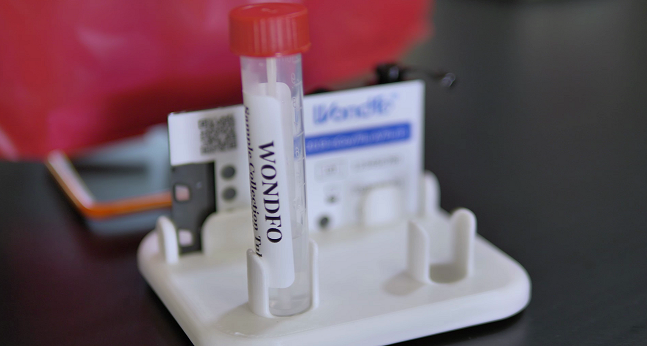
On the other hand, antigen tests work by lab-produced antibodies which combine existing antigen (virus) in the patient’s sample taken from nose/throat/saliva/sputum. It underperforms PCR a little in specificity or sensitivity but antigen test is much faster than PCR in delivering test results (usually about 15 minutes). According to researches, the sensitivity of antigen tests have been rapidly improved paired with PCR’s, approaching 95-100%. Different from PCR, which requires delicate apparatus to deal with the sample in labs, antigen tests need neither extra equipment nor professional techniques for operation; thus antigen tests (sometimes called rapid tests) can be done in various conditions, such as in clinics, pharmacies, customs, hotels for quarantine and even at home.
However, it should be clear that COVID-19 test result can tell whether you are infected or not, but usually do not tell you which variant caused your infection.
Can Antibody Tests Detect Omicron?
Theoretically speaking, yes. When someone is infected with coronavirus, his/her immune system is triggered to secrete antibodies and immune cells to eliminate the intruder. That is, when antibodies to coronavirus is detected, there has been viruses in the human body.
However, vaccine, usually made with weakened or dead virus, causes the same immune response, working as a fire drill for possible COVID-19 infection in future. Thus, for those who have received vaccines, antibody tests are usually positive and cannot distinguish between vaccine-related immunity and current infection.
Can Omicron Be Treated Like Flu?
Not recommended. Though it has been widely acknowledged that Omicron triggers less severe symptoms, reduced hospitality and less deaths, it is hard to tell whether such status is caused by “less fatal variant” or by comprehensively improved immunity with vaccine or previous infection. Furthermore, there have been deaths of people infected with Omicron, which is a 100% sorrow for them and their family no matter how mild the virus is to other people.

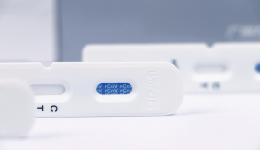 The first developed technology platform with various application scenarios, including infectious disease, fertility, DOA, etc.
The first developed technology platform with various application scenarios, including infectious disease, fertility, DOA, etc. 50+ kinds of reagents and five high-performance devices, focusing on detecting cardiovascular disease, inflammation, kidney injury, sex hormones, thyroid function, diabetes, tumor, and others.
50+ kinds of reagents and five high-performance devices, focusing on detecting cardiovascular disease, inflammation, kidney injury, sex hormones, thyroid function, diabetes, tumor, and others. Single-dose Chemiluminescense Immunoassay Platform
Single-dose Chemiluminescense Immunoassay Platform Wondfo optical blood coagulation analyzer is the first one in the world that can test PT, APTT, TT, FIB, and ACT simultaneously.
Wondfo optical blood coagulation analyzer is the first one in the world that can test PT, APTT, TT, FIB, and ACT simultaneously.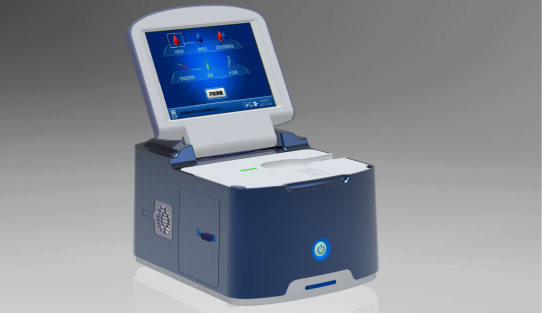 Our Blood Gas Analyzer BGA-102 can produce the result in 30s. Its advantages of portability, easy operation, durability, and high performance make it ideal for clinics, laboratories, and hospitals.
Our Blood Gas Analyzer BGA-102 can produce the result in 30s. Its advantages of portability, easy operation, durability, and high performance make it ideal for clinics, laboratories, and hospitals. Ready-to-use lyophilized RT-PCR Reagent;
Ready-to-use lyophilized RT-PCR Reagent; Wondfo PA-3600 IHC Staining System
Wondfo PA-3600 IHC Staining System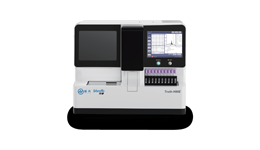 The Wondfo Truth-H80E HPLC Hemoglobin Analyzer is a high-performance diagnostic device designed for rapid and precise measurement of glycosylated hemoglobin (HbA1c)—the gold standard for diabetes diagnosis.It support the standard mode and variant mode and provide the result within 60-90seconds.
The Wondfo Truth-H80E HPLC Hemoglobin Analyzer is a high-performance diagnostic device designed for rapid and precise measurement of glycosylated hemoglobin (HbA1c)—the gold standard for diabetes diagnosis.It support the standard mode and variant mode and provide the result within 60-90seconds. This year, the summit will place a special focus on collaboration across different fields to explore the application of POCT and optimize clinical pathways. In the meantime, drive innovation by adoption of new technologies and biomarkers.
This year, the summit will place a special focus on collaboration across different fields to explore the application of POCT and optimize clinical pathways. In the meantime, drive innovation by adoption of new technologies and biomarkers. Finecare™ Vitamin D, from complexity to simplicity
Finecare™ Vitamin D, from complexity to simplicity Building A World Free from Antibitoic Overuse
Building A World Free from Antibitoic Overuse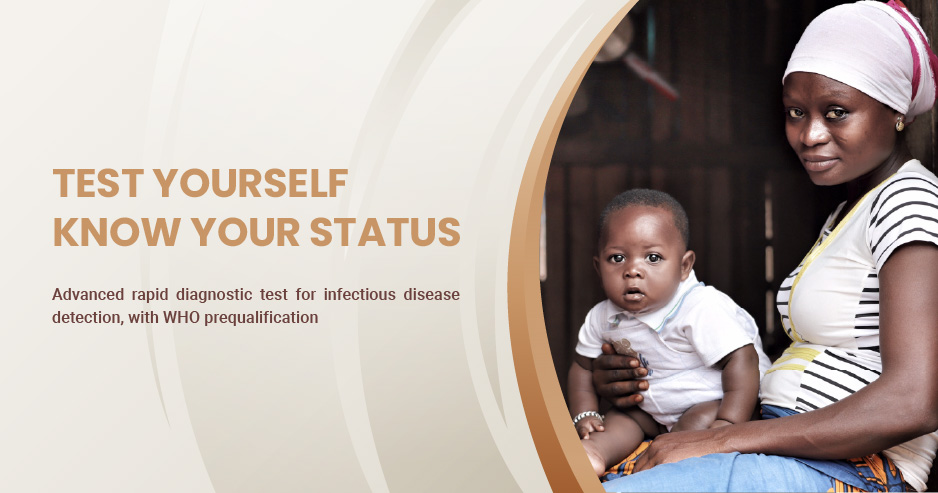 Advanced rapid diagnostic test with WHO prequalification for infectious disease
Advanced rapid diagnostic test with WHO prequalification for infectious disease The Future Intelligent Medical Assistant to Healthcare
The Future Intelligent Medical Assistant to Healthcare Fight against the pandemic through continuous innovation
Fight against the pandemic through continuous innovation







































